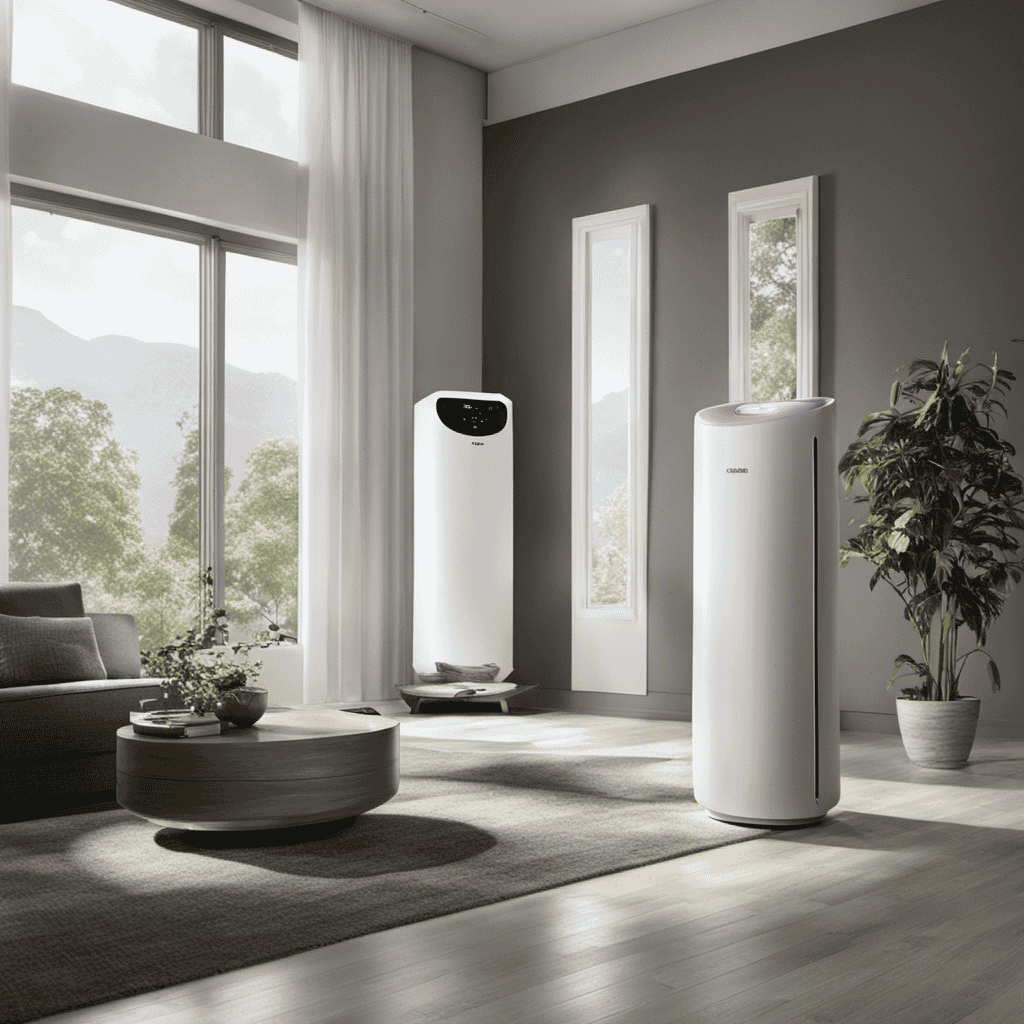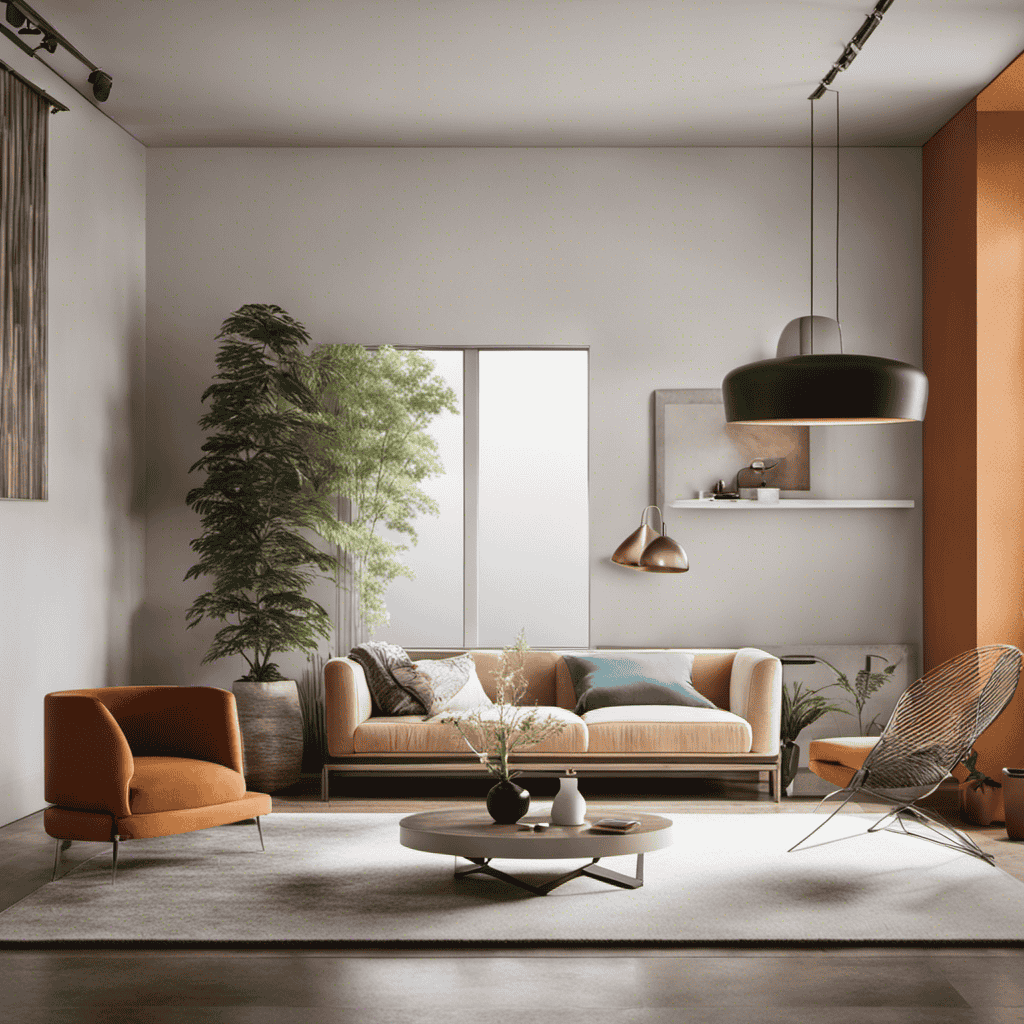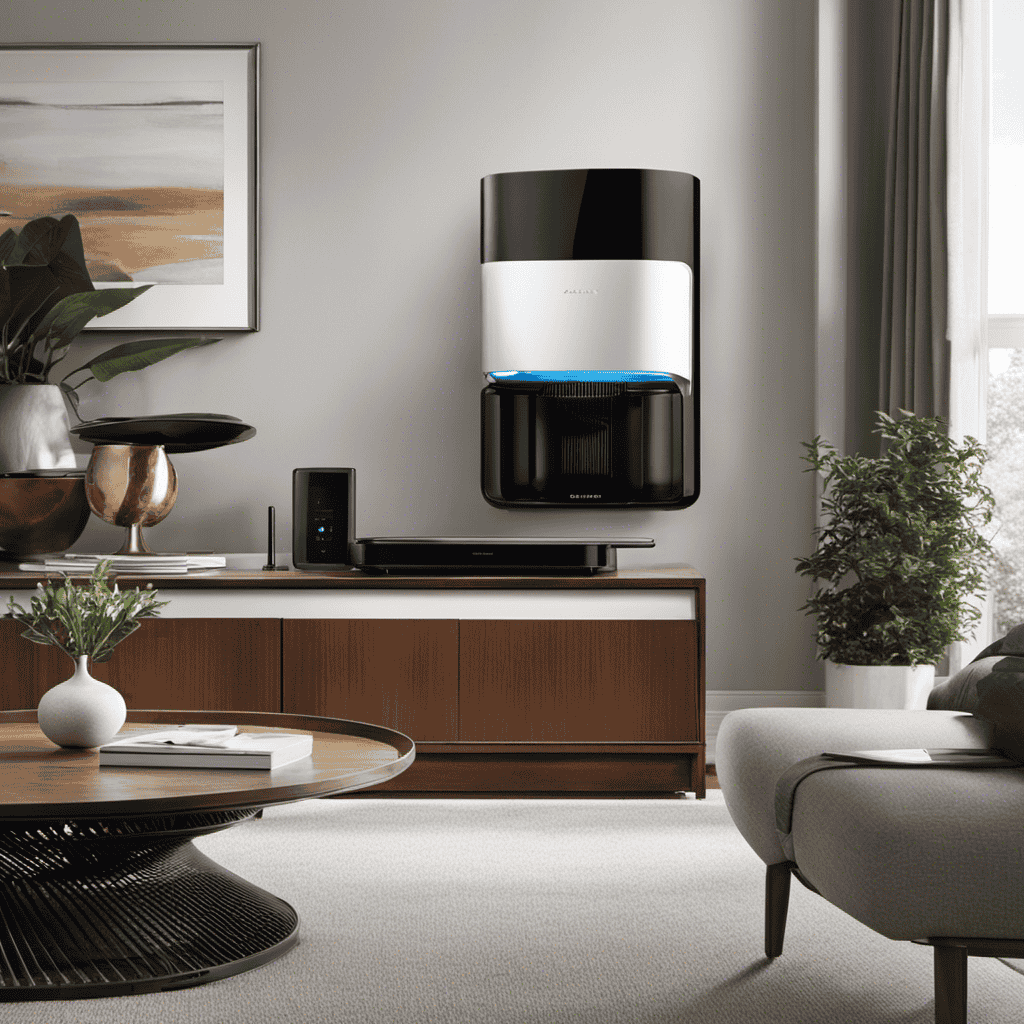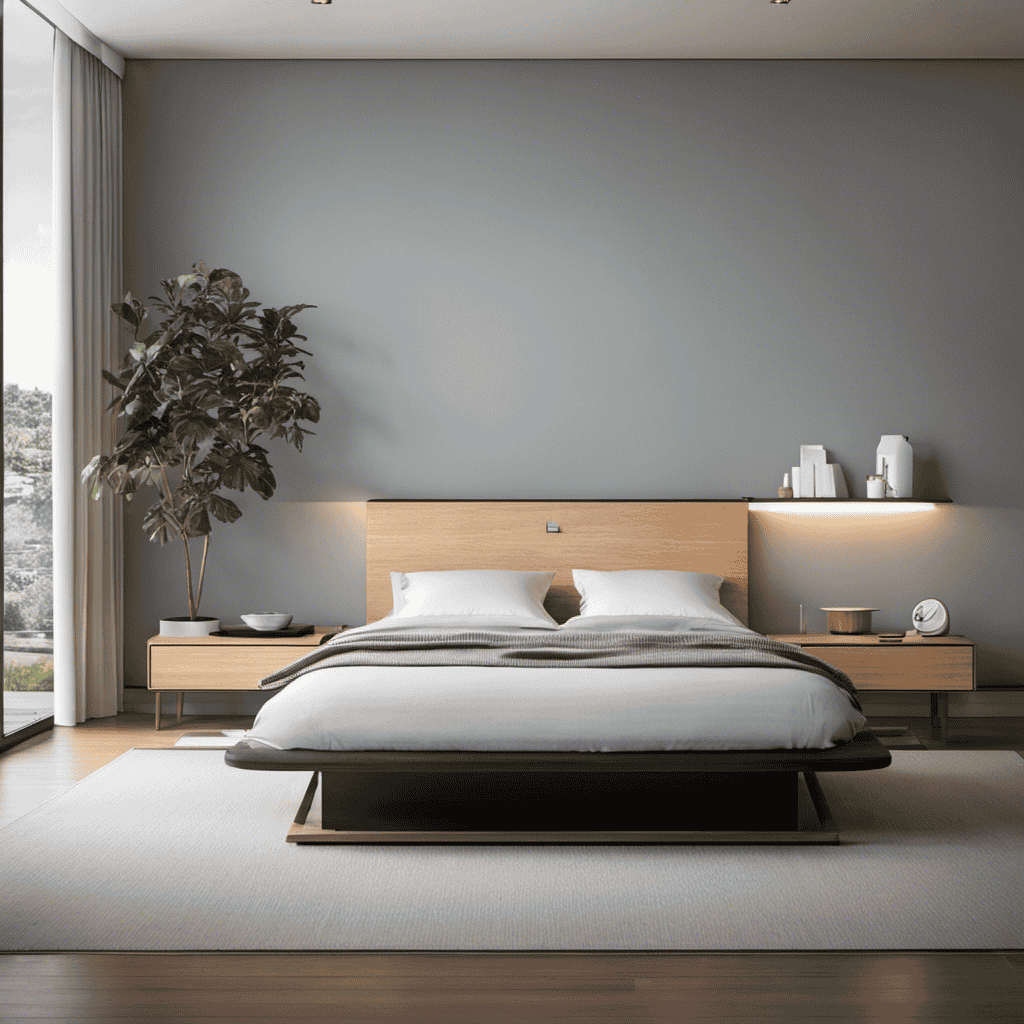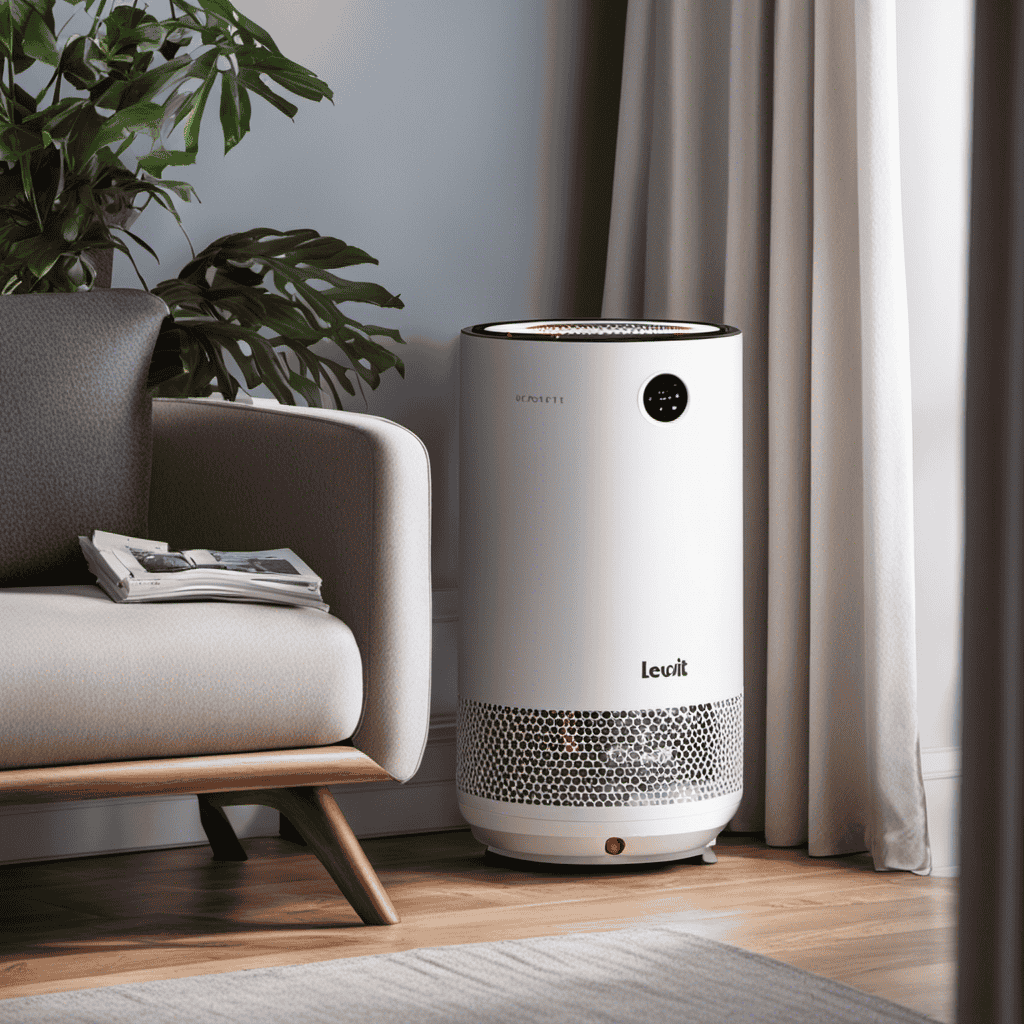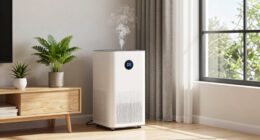Let’s explore the timeless debate: which is superior, an air humidifier or purifier? We all strive for the optimal solution when it comes to maintaining a clean and cozy living space.
In this article, we will explore the benefits and drawbacks of both air humidifiers and purifiers, examining how they work and what they can do for your home. By weighing the pros and cons, we’ll help you make an informed decision that suits your air quality needs.
So, let’s get started and find out which option is right for you.
Key Takeaways
- Clean air is essential for a healthy home environment and can prevent respiratory problems, allergies, and cardiovascular issues.
- Humidifiers add moisture to the air and alleviate dry skin, throat, and eyes, while also improving sleep quality and easing symptoms of respiratory conditions.
- Air purifiers use filters to trap and remove contaminants from the air, improving indoor air quality and reducing the risk of respiratory problems.
- The choice between a humidifier and a purifier depends on specific needs and air quality concerns, with humidifiers being beneficial for alleviating dryness and respiratory issues, and purifiers being effective at removing allergens and improving overall air quality.
The Importance of Clean Air in Your Home
Clean air is essential for a healthy home environment. The importance of air quality cannot be overstated, as it directly impacts our overall well-being. Breathing in clean air has numerous health benefits that contribute to a better quality of life.
Studies have shown that exposure to pollutants and allergens in the air can lead to respiratory problems, allergies, and even cardiovascular issues. On the other hand, clean air helps reduce the risk of these health issues, allowing us to breathe easily and comfortably. It improves our lung function, strengthens our immune system, and promotes better sleep.
Furthermore, clean air can enhance cognitive function, productivity, and overall mental well-being. Therefore, ensuring clean air in our homes is crucial for maintaining a healthy and thriving living environment.
Understanding Air Humidifiers and Their Benefits
When it comes to improving the air quality in your home, there are two main options to consider: air humidifiers and air purifiers.
Both devices serve different purposes and offer unique benefits.
In this discussion, we will explore the differences between humidifiers and purifiers, as well as the specific advantages of using a humidifier in your home.
Humidifier Vs Purifier
The humidifier can help relieve dryness in the air, while the purifier can remove airborne particles and allergens. When it comes to choosing between a humidifier and a purifier, it’s important to consider your specific needs and the benefits each device offers.
Here are some key points to consider:
-
Humidifier benefits:
-
Adds moisture to the air, which can alleviate dry skin, dry throat, and dry eyes.
-
Helps ease symptoms of respiratory conditions such as asthma and allergies.
-
Can improve sleep quality by preventing dryness in the nasal passages.
-
Purifier effectiveness:
-
Removes airborne particles like dust, pet dander, pollen, and mold spores.
-
Helps improve indoor air quality, reducing the risk of respiratory issues.
-
Can be particularly beneficial for individuals with allergies or sensitivities to airborne allergens.
Ultimately, the choice between a humidifier and a purifier depends on your specific needs and the air quality concerns you have.
Benefits of Humidifiers
If you’re experiencing dry skin, a humidifier can help alleviate it by adding moisture to the air. Maintaining proper humidity levels in your home is important for your overall health and well-being.
Dry air can cause a variety of health issues, including dry skin, irritated eyes, and respiratory problems. By using a humidifier, you can restore moisture to the air, which can help relieve these symptoms. Additionally, humidifiers can also help with allergies and asthma, as they can reduce the presence of allergens and irritants in the air.
By increasing the humidity levels, a humidifier can make your home a more comfortable and healthier environment to live in.
Now, let’s explore air purifiers and how they work.
Exploring Air Purifiers and How They Work
Air purifiers use filters to trap and remove contaminants from the air. They are an effective way to improve indoor air quality and reduce the risk of respiratory problems.
When exploring air purifier filters, it’s important to consider the different types of filters available. Here are three key types:
-
HEPA filters: These high-efficiency filters can capture particles as small as 0.3 microns, including dust, pollen, pet dander, and mold spores.
-
Activated carbon filters: These filters are effective at removing odors, chemicals, and volatile organic compounds (VOCs) from the air.
-
UV-C filters: These filters use ultraviolet light to kill bacteria, viruses, and other microorganisms.
When comparing different types of air purifiers, it’s essential to consider factors such as room size, filter replacement costs, noise levels, and energy efficiency. Additionally, reading customer reviews and independent lab tests can provide valuable insights before making a purchase decision.
Comparing the Pros and Cons of Air Humidifiers
Comparing the pros and cons of air humidifiers can help you decide if they are the right choice for improving indoor air quality.
Air humidifiers work by adding moisture to the air, which can be beneficial for those suffering from dry skin, allergies, or respiratory issues.
However, they also require regular maintenance to prevent the growth of mold and bacteria. It is important to clean and change the water regularly, as well as clean or replace any filters.
Additionally, choosing the right air humidifier is crucial to ensure optimal performance. Factors to consider include the size of the room, the desired level of humidity, and the noise level of the humidifier.
By weighing these factors, you can determine if an air humidifier is the best option for your indoor air quality needs.
Moving on to examining the advantages and disadvantages of air purifiers…
Examining the Advantages and Disadvantages of Air Purifiers
When considering the effectiveness of air purifiers against allergens, it is important to analyze their impact on indoor air quality.
As a consumer, I want to know if these devices can truly remove allergens and improve the air I breathe.
Purifier Effectiveness Against Allergens
The effectiveness of the purifier against allergens depends on the specific model you choose. When considering which purifier to purchase, there are some important factors to keep in mind.
-
Filter type: It is recommended to look for purifiers with HEPA filters. These filters are highly effective at trapping allergens such as dust mites, pollen, and pet dander.
-
Clean air delivery rate (CADR): The CADR indicates how quickly and efficiently the purifier can remove allergens from the air. A higher CADR is generally preferred.
-
Room size: It is important to choose a purifier that is suitable for the size of the room where you want to use it. The size of the room can affect the overall effectiveness of the purifier.
By selecting a purifier with the right filter type, CADR, and appropriate room size, you can maximize its effectiveness in reducing allergens in your indoor environment.
Now, let’s explore the impact of air purifiers on indoor air quality.
Impact on Indoor Air
Using an air purifier can significantly improve the quality of indoor air. Indoor air pollutants, such as dust, pet dander, mold spores, and volatile organic compounds (VOCs), can have detrimental effects on our health. These pollutants can cause respiratory issues, allergies, and even contribute to the development of chronic diseases.
By removing these harmful particles from the air, air purifiers help reduce the risk of health problems associated with poor indoor air quality. Numerous studies have shown that using air purifiers can effectively decrease the concentration of indoor air pollutants, providing cleaner and healthier air to breathe.
This is particularly beneficial for individuals with allergies or asthma, as air purifiers can help alleviate their symptoms and improve their overall quality of life.
Determining Your Air Quality Needs: Humidifier or Purifier
To determine which device is better for you, consider your air quality needs and whether a humidifier or purifier would be more beneficial.
When it comes to improving air quality, both devices have their advantages. Here are some key factors to consider:
-
Air Quality Measurement: Before deciding, it’s important to assess the specific pollutants present in your indoor environment. A purifier is effective at removing particles such as dust, pollen, and pet dander. On the other hand, a humidifier helps maintain optimal humidity levels, preventing dryness and reducing the spread of airborne viruses.
-
Health Benefits of Clean Air: Breathing clean air is crucial for our well-being. A purifier can reduce allergy and asthma symptoms by removing allergens and pollutants. Additionally, it can eliminate harmful gases and odors. Meanwhile, a humidifier can alleviate respiratory issues, moisturize dry skin, and prevent dryness in the nose and throat.
Consider these factors to make an informed decision about which device will best meet your air quality needs. Remember, both a humidifier and a purifier can contribute to a healthier indoor environment.
Factors to Consider When Choosing Between an Air Humidifier and Purifier
Consider your specific air quality needs and the benefits each device can provide in order to make an informed decision between an air humidifier and purifier.
When choosing between the two, there are several factors to consider.
Firstly, think about the primary issue you want to address. If dry air is causing discomfort, a humidifier can add moisture to the air and alleviate symptoms such as dry skin and throat.
On the other hand, if you are concerned about pollutants and allergens, an air purifier can effectively remove particles like dust, pollen, and pet dander.
Additionally, consider the size of the space you want to treat. Humidifiers are generally more suitable for smaller rooms, while purifiers can handle larger areas.
Ultimately, your decision should be based on your specific needs and the desired outcome for your indoor air quality.
Making the Best Decision for Your Home: Humidifier or Purifier?
When weighing the options for your home, it’s important to understand the benefits each device can offer. Both air purifiers and humidifiers have clean air benefits, but they serve different purposes. Here are a few key points to consider:
-
Air purifiers:
-
Removes airborne pollutants like dust, pollen, and pet dander
-
Helps alleviate symptoms of allergies and asthma
-
Enhances overall air quality by capturing harmful particles
-
Humidifiers:
-
Adds moisture to the air, preventing dryness
-
Relieves dry skin, congestion, and irritated sinuses
-
Helps maintain a comfortable indoor humidity level
When choosing between a purifier and a humidifier, it’s essential to assess your specific needs. If you suffer from allergies or respiratory issues, an air purifier may be more beneficial. However, if you frequently experience dryness and discomfort, a humidifier could be the better choice. Ultimately, the decision should be based on your personal circumstances and desired outcomes.
Frequently Asked Questions
Can an Air Humidifier Also Purify the Air?
An air humidifier can improve indoor air quality by adding moisture to dry air, which can benefit respiratory health. However, it does not actively purify the air like an air purifier, which effectively removes pollutants and allergens.
How Often Should I Clean and Maintain an Air Purifier?
I clean and maintain my air purifier regularly to ensure optimal performance. The recommended cleaning frequency varies depending on the model, but generally, it’s best to clean the filters every 3-6 months and follow the manufacturer’s instructions for maintenance.
Can an Air Purifier Eliminate Odors in the Air?
An air purifier can effectively eliminate odors in the air by capturing and filtering out particles that cause unpleasant smells. This makes it a better option compared to an air freshener, as it tackles the root of the problem.
Are There Any Health Risks Associated With Using an Air Humidifier?
Using an air humidifier can have potential health risks if not used properly. It is important to maintain recommended humidity levels to avoid mold and bacteria growth. However, there are also many health benefits associated with using an air humidifier.
Can an Air Purifier Help With Allergies and Asthma?
An air purifier can be effective in reducing allergens and improving air quality, providing benefits for those with allergies and asthma. It removes airborne particles and pollutants, helping to alleviate symptoms and create a healthier indoor environment.
Conclusion
In conclusion, after thoroughly examining the benefits and drawbacks of both air humidifiers and purifiers, it is clear that there is no one-size-fits-all answer to which is better.
It ultimately depends on your specific air quality needs and the environment in which you live. However, it is crucial to prioritize clean air in your home, as it plays a significant role in our overall health and well-being.
As the famous saying goes, ‘Cleanliness is next to godliness,’ and in this case, it is next to optimal indoor air quality.
